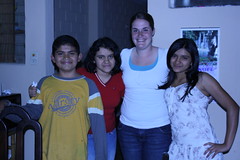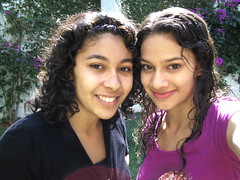 There is so much suffering all around me here. Actually, today was the first time I thought maybe Guatemala is not as ‘broken’ as I thought, but rather I am looking through a magnifying glass at how broken humanity is in general. I remember the night our Guatemalan group visited Guana Chapi. I’ll never forget the overwhelming since of suffering I came away with from there. The three families told their stories in very fluid Spanish-but I kept seeing this girl. She worked for the restaurant, but was constantly watching our group. My heart just kept going out to her for some reason. Finally I asked her where she was from and it was as if I gave her mouth a key and turned it for her. She told me how she was from El Salvador and that she came illegally across the border to live with her uncle. She left her entire family and country because of economic reasons. I think she saw everyone telling his or her stories and after feeling so much suffering herself, just wanted someone to ask her about her story. I was blessed with her openness, but I was again burdened with the suffering of many that I cannot begin to understand. Yet somehow, still people come to America. How can I be a light to people here? Again, I feel as if there is a call on my life to-hah-break down walls, to discover stories and give them a voice. I have this longing for this girl to know Jesus-and to learn to know Lisa. Perhaps she could connect with her well and begin to find a community. Perhaps she would find the hope of Jesus, or the reassurance of faith.
There is so much suffering all around me here. Actually, today was the first time I thought maybe Guatemala is not as ‘broken’ as I thought, but rather I am looking through a magnifying glass at how broken humanity is in general. I remember the night our Guatemalan group visited Guana Chapi. I’ll never forget the overwhelming since of suffering I came away with from there. The three families told their stories in very fluid Spanish-but I kept seeing this girl. She worked for the restaurant, but was constantly watching our group. My heart just kept going out to her for some reason. Finally I asked her where she was from and it was as if I gave her mouth a key and turned it for her. She told me how she was from El Salvador and that she came illegally across the border to live with her uncle. She left her entire family and country because of economic reasons. I think she saw everyone telling his or her stories and after feeling so much suffering herself, just wanted someone to ask her about her story. I was blessed with her openness, but I was again burdened with the suffering of many that I cannot begin to understand. Yet somehow, still people come to America. How can I be a light to people here? Again, I feel as if there is a call on my life to-hah-break down walls, to discover stories and give them a voice. I have this longing for this girl to know Jesus-and to learn to know Lisa. Perhaps she could connect with her well and begin to find a community. Perhaps she would find the hope of Jesus, or the reassurance of faith.
So many immigrating to America-and why? Vernon and Jim talked about the colonization of Central America and how as a result, now Central America has problems with connecting some communities because of the way roads were built towards the ports and not between cities. Countries in Central America definitely have a hard position to try and become economically stable countries. They have become stuck in cycles of debt, taking loans, increasing industry, but hurting the poor guy-who then, in desperation causes deforestation, hurting the environment and possibly causing mudslides, which ends up killing people and destroying efforts to increase the economy in the country.
Are we “destined”-I hate that word-to be a victim of our homeland? If someone is born in Guatemala, are they sucked into the suffering cycles we heard about in our classes and from the immigrant families? 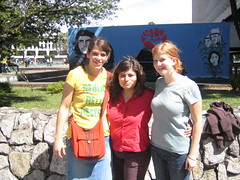 If born in America, do we automatically have the freedoms we are allowed and seek after the ‘American Dream?’ Similarly, faith. If a person is born in a Christian home, are they going to become a Christian more likely than the child born to Buddhists? How do we handle the cards dealt us, or the plans God has for us? I am blessed, I realize that. How do I be thankful and not feel guilty? Goodness. Maybe thankfulness and gratitude is the seed of passion, which love waters until a blooming passion springs forth with new life.
If born in America, do we automatically have the freedoms we are allowed and seek after the ‘American Dream?’ Similarly, faith. If a person is born in a Christian home, are they going to become a Christian more likely than the child born to Buddhists? How do we handle the cards dealt us, or the plans God has for us? I am blessed, I realize that. How do I be thankful and not feel guilty? Goodness. Maybe thankfulness and gratitude is the seed of passion, which love waters until a blooming passion springs forth with new life.
-Monika Burkholder
In some ways it’s hard to believe that only two weeks have passed on our cross-cultural time. Our time has been filled with much learning through lectures, field trips, time with our host families and being in Guatemala City. This last week was full of many adventures that were invaluable experiences. On Tuesday our group was privileged to hear from Hector Castañeda. He told our group about the last 70 years of history in Guatemala. His insights into the culture and consequences of the history shone through his words and personal experience. Guatemala has suffered much and continues to deal with the consequences even now. His words evoked many questions from our group and we could have talked with him for much longer.
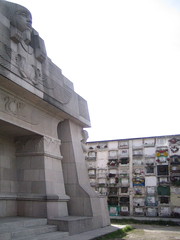 Wednesday afternoon was our free afternoon for the week and the group was kept busy with a short meeting in the early afternoon followed by time doing homework, quick trips across the street to Novicentro and basking in the warmth of the sun. On Thursday afternoon our group piled into a bus to visit the Cemetery in Zone Three where we split into small groups. The cemetery is split into small roads with endless lines of tombs. For the rich they build large tombs and they are often adorned with the riches of the deceased and fresh flowers left by their loved ones. For those who cannot afford these tombs there are large walls for the mass burials. Each grave is marked with a plaque giving the name and dates of birth and death. After our small group scavenger hunts we met back as a group and visited five significant memorials within the cemetery as a way of discussing the history of Guatemala.
Wednesday afternoon was our free afternoon for the week and the group was kept busy with a short meeting in the early afternoon followed by time doing homework, quick trips across the street to Novicentro and basking in the warmth of the sun. On Thursday afternoon our group piled into a bus to visit the Cemetery in Zone Three where we split into small groups. The cemetery is split into small roads with endless lines of tombs. For the rich they build large tombs and they are often adorned with the riches of the deceased and fresh flowers left by their loved ones. For those who cannot afford these tombs there are large walls for the mass burials. Each grave is marked with a plaque giving the name and dates of birth and death. After our small group scavenger hunts we met back as a group and visited five significant memorials within the cemetery as a way of discussing the history of Guatemala.
After our learning in the cemetery we walked to the back of the cemetery, which overlooks the city dump. I don’t think I was quite prepared for the vultures, smells, and overwhelming amount of stuff that was in the dump. SO many people work in the dump to make their livings. Our group watched a movie on Friday afternoon about the people who work there. For them, it is their survival. They don’t want the dump to close because that would mean they would lose their jobs. The implications of all the issues surrounding the dump amaze and sadden me.
On Friday our group met in the afternoon for debriefing. We discussed some of the issues we were faced with this week and ended with a time of worship together. As our voices lifted together in song to sing ¨Juntos Como Hermanos¨ and a praise and worship song we were joined together.
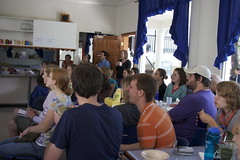 Tuesday, the 20th we gathered in the cafeteria at CASAS during our break from Spanish classes to watch the inauguration of President Obama. Occasionally the live streaming would break up, but we did get to see him sworn in and heard all of his speech. There were Guatemalans gathered with us watching as well. Even in Guatemala this event was much anticipated and brought hope. Our group has grown immensely through our short time here and I look forward to seeing how we continue to grow together.
Tuesday, the 20th we gathered in the cafeteria at CASAS during our break from Spanish classes to watch the inauguration of President Obama. Occasionally the live streaming would break up, but we did get to see him sworn in and heard all of his speech. There were Guatemalans gathered with us watching as well. Even in Guatemala this event was much anticipated and brought hope. Our group has grown immensely through our short time here and I look forward to seeing how we continue to grow together.
-Peyton Erb
